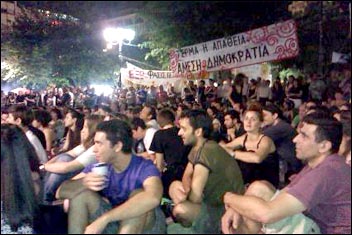
Xekinhma, Greek section of CWI, on massive general strike in Greece on 15 June 2011, photo Stephan Kimmerle
Greece has recently experienced a barrage of strikes by different sections of the working class – involving transport workers, teachers, some council workers, taxi drivers, mental health workers and others – against the Pasok government’s latest austerity measures. These policies have been demanded by the ‘troika’ of international banks, capitalist institutions and EU governments who are determined to make the working class pay for the capitalist crisis.
Nikos Anastasiades of Xekinima, CWI in Greece, spoke to the Socialist about the crisis and how the Greek working class can fight back.
Could you explain, briefly, what the austerity measures will mean to the majority of Greek people?
The government recently announced some new austerity measures. “New” has become a standing joke in Greece as the government announces new measures every week!
After the destruction of living standards caused by previous attacks, the government has now announced measures that will lead to more attacks on the working class. These attacks include: the layoffs of public sector workers – they plan to sack 200,000 out of a total of 750,000 public sector workers in the next few years. This plan will start this week by putting some thousands of workers on ‘suspension’. Public sector pay will also be slashed by an average of 50%.
The government is planning to tax those workers on the lowest incomes, combined with the introduction of an annual ‘household tax’ – a poll tax. The Papandreou government intends to double the price of fuel for household use.
In addition, there are attacks on education funding, and the implementation of university tuition fees.
Before the current economic and financial crisis Greece was one of the poorest countries in the European Union. These cuts will plunge society into absolute poverty and create a ‘lost generation’ of unemployed people.
Last week official figures showed that the number of suicides due to economic reasons doubled in the last year.
Capitalist politicians and international financiers say these government spending cuts are necessary to rescue the Greek economy. But what is the real economic situation?
In 2009 when the International Monetary Fund (IMF) visited Greece they said that in two years’ time the country will be out of the recession and will be in a better position to repay its sovereign debt. But now the economic situation is actually worse. They told us that if we “satisfy the markets” we will be better off, but every time we satisfy the markets they get more greedy! They are throwing us into a bottomless pit.
This year all the indications are that the Greek economy will shrink by 5%. Many factories and enterprises are going out of business and closing down. Officially there are an extra 600 unemployed every day. The unemployment rate is officially 16% or 800,000 workers, (the government includes in employment anyone who works one hour or more a week). This is a doubling of the jobless rate in just three years.
But all this economic destruction has not contributed to any success in reducing the deficit. In fact the government has missed all its financial targets. The state’s income revenues are very low because of a shrinking tax base due to the recession while expenditure has increased to pay for unemployment benefits (even though these benefits are very low).
The one figure that continues to grow is the billions of euros in debt repayments to the banks and international creditors, and also the financial help to the local banks. These are the only things the government seems to care about.

Massive general strike in Greece on 15 June 2011, photo Stephan Kimmerle
How are working people and the wider population dealing with these cuts and attacks on their living standards? And what are the trade unions and left parties doing to organise resistance?
There is a mixture of anger and desperation among people. Many are suffering unemployment; many are unable to make ends meet. But at the same time many understand the need to fight back as they see no end to the government’s austerity measures.
In the last year there have been mass mobilisations with two million people coming out onto the streets in June – the “enraged” – to protest at attacks on their living standards. There have also been numerous strikes and demonstrations by workers.
The problem is not the lack of a willingness to fight back but the leadership of the trade unions is not up to the tasks facing us. With a capitalist ruling class intent on destroying our living standards, sometimes the trade union leaders call 24-hour general strikes – but without a concrete plan of how to defeat the government.
They do this partly to ‘let off steam’. But they also fail to offer a serious alternative programme to Pasok’s cuts and in defence of living standards. They do not properly engage in a democratic dialogue with the unions’ rank and file membership.
People recognise their own potential power when they are mobilised but at the same time they do not feel they have a tool to succeed in their struggles.
The mass left parties have different kinds of problems. The Communist Party (KKE) puts forward slogans that sometimes appeal and an explanation of the capitalist crisis – but it is incredibly sectarian, refusing to organise beyond its own ranks.
Syriza, an ‘umbrella’ broad left party, doesn’t take political initiatives and lacks a political programme that can lead to a generalised movement to bring down the government and tackle the crisis.
What is Xekinima’s socialist alternative to stop the cuts and provide people with a solution to the crisis?
If this austerity policy is continued there will be no future for Greek workers and youth. The government and the IMF and bankers, if not stopped, will drive down living standards still further. The only way to stop these attacks is to stop the debt repayments to the banks, the institutions responsible for triggering this crisis.
This requires coordinating the different protest movements and the struggles of the working class behind a political programme of socialist demands to end the capitalist crisis and move forward.
We call for the nationalisation of the banks and the renationalisation of the privatised utilities. Nationalise the commanding heights of the economy under democratic workers’ control in order to utilise the enormous wealth and resources – created by Greek workers in the first place – for investment in the economy and to create jobs.
The struggles of Greek workers and youth should be linked to an internationalist perspective because the capitalist crisis is affecting workers throughout the world. There cannot be a solution to the crisis solely within one nation state. Workers need to fight for a Europe in their class interests, for a socialist federation of European states.
In Greece we have the immediate prospect of renewed strikes and a new mass non-payment movement regarding the poll tax and household tax. There is also the education movement regarding the universities and schools.
If these struggles are linked together they could succeed in bringing down the government and advancing a different strategy to end the crisis.
More austerity, more misery
The latest tranche of Pasok government austerity measures are in addition to previous savage cuts in jobs, pensions and the minimum wage which have resulted in an average 50% drop in household income.
The new cuts will mean:
- Monthly pensions above a €1,200 (£1,049) threshold will be cut by 20% and those retiring below 55 will see a 40% cut in pensions above a €1,000 (£874) threshold.
- The number of civil servants suspended on partial pay will rise by 50% to 30,000 by the end of the year. If they cannot be redeployed within the year they will be made redundant. In total, the government plans to axe 200,000 jobs out of 750,000 civil service jobs.
- And the threshold at which income tax becomes payable on annual salaries will drop from €8,000 (£7,007) to €5,000 (£4,380). (In the UK the personal allowance threshold is £7,475)







